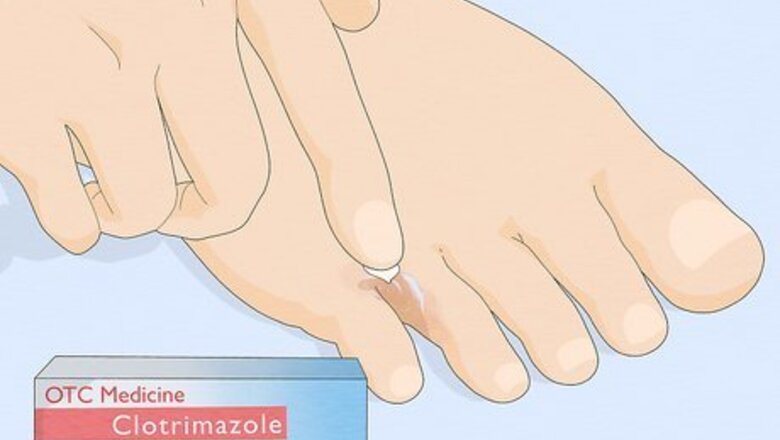
views
X
Research source
While it may be a little uncomfortable, the good news is that getting rid of foot fungus is usually extremely easy, and it’s unlikely that you’ll need to seek out medical help. However, in the event that the fungus doesn’t clear up after 2 weeks of at-home treatment, you’re in serious pain, or the fungus spreads to your nails, see a doctor. They’ll be able to prescribe you something stronger to clear the fungus up.
How do you get rid of foot fungus at home?
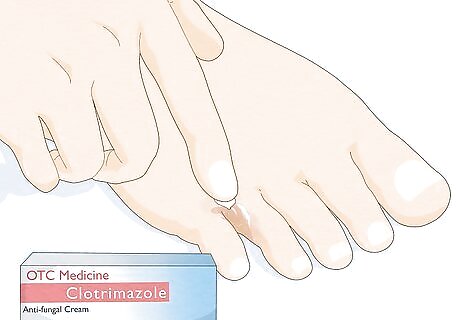
Apply an antifungal topical treatment twice a day for two weeks. There are a ton of foot fungus treatment options, and basically all of them will help clear up your fungus. Talk to a pharmacist or just pick up any OTC antifungal cream, powder, spray, or lotion. Read the label carefully to apply it to your foot. Typically, you just apply the cream, powder, spray, or lotion twice a day until the fungus goes away. According to board-certified podiatrist Miguel Cunha, "A doctor may also prescribe an oral antifungal for more severe cases." So long as the ingredients in your product include clotrimazole, econazole, ketoconazole, miconazole, naftifine, oxiconazole, sulconazole, terbinafine, or terconazole, it’s going to help combat the fungus. Ask a pharmacist to help you out if you want to pick the absolute best option based on how your skin is looking, but pretty much any antifungal product will work.
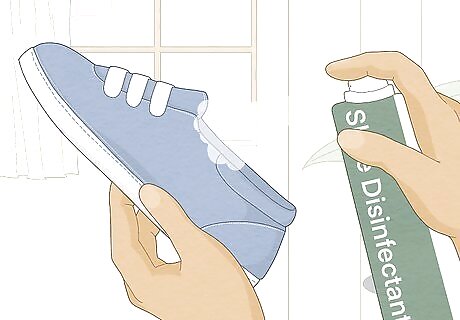
Treat all of your shoes with a disinfectant to kill the fungus inside. Whatever is causing your foot fungus is probably going to be inside of your shoes as well. If you don’t treat your shoes at the same time you’re treating your foot, the fungus may come back. Board-certified podiatrist Miguel Cunha suggests "spraying something like Lysol along the inside and outside of your shoes, which helps kill the bacteria or fungus." Cunha stresses that "both bacteria and fungus can lead to odor, athlete's foot, or fungal nails later on." You can do this multiple times if you want to be totally sure that you’ve gotten rid of all of the spores.
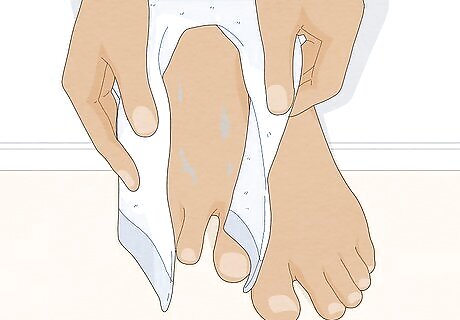
Keep your feet as dry as possible until the fungus is gone. Fungus likes dark, moist environments, so keeping your feet dry and aired out will help speed the healing process up. Don’t wear shoes unless you absolutely have to, and if you do need to wear shoes, pick a breathable pair. Change your socks out whenever they start to get damp, and never put the same socks on after you’ve taken them off. Alternating the shoes you’re wearing every day may also help. Dry your feet thoroughly after you get out of the shower every day. Don’t let them air dry on their own. Do not go barefoot in public. This is the most common way a foot fungus spreads.
How do you treat severe foot fungus?
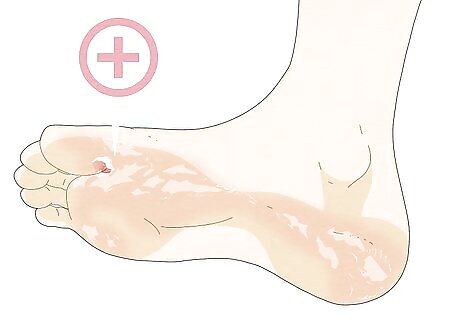
See a doctor to get a prescription for an antifungal medication. If the rash covers most of your foot, your skin is flaking off, or the infection has spread to your nail, it’s best to see a doctor. These kinds of fungal infections typically require stronger oral medication. In most cases, your doctor will tell you to take the drug for 6-12 weeks until the fungus clears up. If your nail is in a really rough shape, your doctor may prescribe you a medicated nail polish or cream. Your doctor may also suggest a minor surgical procedure to apply the antifungal drug directly underneath your nail, or remove it entirely. These drugs are extremely effective, but they can cause damage to your liver for some people. Your doctor may suggest you get regular blood tests while you’re taking the antifungal medication just to keep an eye on things.
How long does it take to get rid of foot fungus?
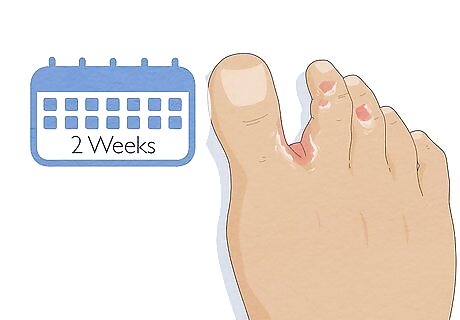
If the fungus doesn’t go away in two weeks, see a doctor. In the vast majority of cases, your foot fungus should clear up after a week or two of treatment. If it doesn’t, see your primary care physician. They’ll be able to prescribe you something stronger to clear up the irritated skin. There are a lot of different fungi out there, and some of them are a little more resilient than others. While most fungal issues will go away after two weeks, it’s possible you’ll need the prescription-strength stuff.
Will foot fungus go away on its own?
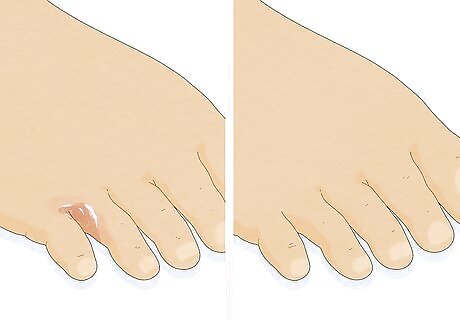
It can, but the fungus is likely to stick around if untreated. In the vast majority, of cases, foot fungus will not go away if you leave it untreated. It may not necessarily get worse, but it is unlikely to get better. In most cases, you’ll be able to treat the fungus just fine at home, but it only goes away on its own roughly 17% of the time. It’s possible for your fungus to spread or grow, so don’t just leave it be and expect it to clear up! This is an easy problem to treat, but it can get out of hand fast if you wait too long.
What causes foot fungus?
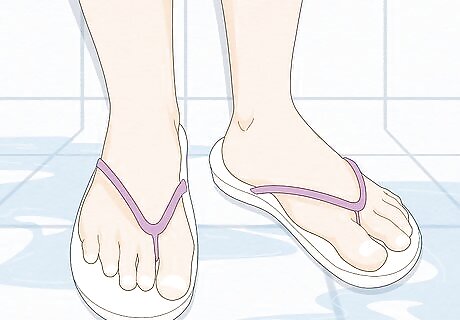
It’s typically caused by walking barefoot in a public space. If you shower at the gym, change your shoes at work, or you work outside with your shoes off, you may accidentally pick a fungus up on the ground. You can also get a foot fungus if you accidentally touch someone else’s skin and they’ve got a fungal infection. Sharing towels with another person can make your feet more susceptible to foot fungus. Locker rooms, communal showers, and gyms are especially likely to harbor foot fungus. If possible, wear flip flops while you’re showering or changing at the gym.
What natural options treat foot fungus?
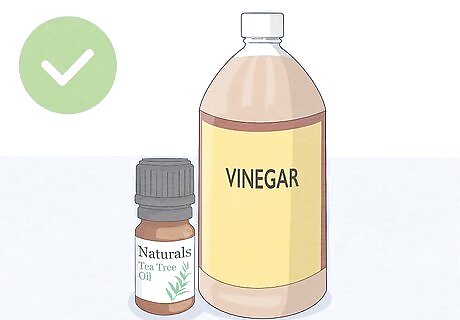
There aren’t any effective alternative treatments out there. Vinegar, snake root, garlic, and thyme are all touted as natural options for foot fungus. Unfortunately, these are not proven to be effective at combatting foot fungus. It’s possible that something like tea tree oil or vinegar might help, but there just isn’t any evidence to support it. The side effects for over-the-counter topical medications are basically nonexistent. The people who do experience side effects typically get a bit of itchiness, burning, or redness, but even then the side effects are harmless and go away on their own. Since these topical treatments are so low-risk, there’s no real reason to try experimenting with DIY home remedies.


















Comments
0 comment